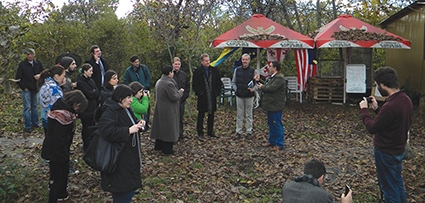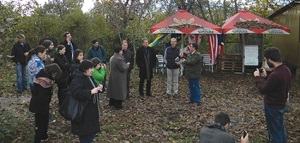Working Towards the “Georgian Village of the Future” in Lagodekhi
Towards the end of last Thursday’s presentation of the new, EU-funded Rural Development Pilot Project underway in Lagodekhi, a short video was shown featuring citizens and government officials from around the country already involved with the project.
“What we are building,” one of the film’s talking heads effused, “is the Georgian village of the future.”
Ambitious words, to be sure, but taken with a grain of salt they might have some truth to them, at least if the local and international drivers behind ENPARD – the European Neighborhood Program for Rural and Agricultural Development, under whose auspices Lagodekhi’s Rural Development Pilot Project is being conducted – have their way.
The long-tested European LEADER method on which the pilot project is modeled allows local citizens and businesses in rural areas to benefit from national and international government funding, while creating a form of local self-governance to oversee those funds known as the Local Action Group (LAG). The proposed “Georgian Village of the Future,” therefore, would be one where individuals, community organizations, and local business cooperate to make their homes more economically viable, more attractive to outsiders, and overall more livable.
After lunch, while a room packed full of Lagodekhi’s most concerned began a two-day workshop strategic planning and leadership exercises at the Protected Area’s administration center, the visiting delegates who had come to Lagodekhi for the project’s presentation left for an afternoon of site visits to organizations that have already become involved with the fledging LAG process.
It began only a short walk from the Protected Area’s main gate, where Victor Kervalishvili and Natalia Kalandadze, owners of the Hotel Bio-Yard, conducted an extensive tour of the property that they’ve spent the last three years developing. Seven-generation Tbiliselebi, both professional academics, the couple changed direction after deciding to buy a summer house in Kakheti. They started buying more parcels adjacent to their house, and before long had begun farming.
“We thought, in a few years this bio-farm will be very much needed,” Ms. Kalandadze explained. “The first year was very difficult, because we had no experience and we had a lot of things to learn. When you make one circle then you know what is what. Now we know what to leave, what to kill and make food, what to sell, how to treat it.” The couple’s philosophy of all-organic conduct led them naturally, she says, to explore the idea of selling their food to guests rather than to supermarkets, hence the natural evolution of two city-slummers’ summer house into a hotel with attached organic farm.
Just down the road, Guesthouse Gardenia was found with its doors wide open, its effulgent owner, Lia Natsarashvili, scurrying the delegates inside. Translators helped explain to delegates from Estonia and Spain the state of the family’s outstanding loans, their plans for an expanded terrace and wine cellar, and the ins and outs of online booking services. Before anyone notices the owner is gone, she reappears, beaming, bearing a cast iron pot bubbled over with red palouzes. The next stop on the tour – a brightly painted string of rooms on the second floor of an old kindergarten building, now serving as the free-to-attend LELI adult education center, which boasts 100 participants and its own beehives – has to be delayed.
Wine in hand, his colleagues and fellow observers eating homemade cheese and pickles and making churchkhela while Ms. Natsarashvili watches, Kaido Sirel, Head of Operations of the EU to Georgia, smiled. “I’m seeing here great, great potential,” he told Georgia Today. “So far we’ve been dealing mainly with state authorities at the capital level. Of course the pilot projects (in Lagodekhi, Borjomi, and Kazbegi) are quite similar, but finally it’s the local people who decide what direction it will take. Some places are focusing on agriculture, some more on tourism, some on other industries. We need to brainstorm with ideas.”
Irakli Sulabaridze, one of the coordinators for the day, helped explain what some of those ideas might look like.
“In Georgia, lots of people have land to survive. But the EU says you don’t have to survive, you have the chance to make a business.” The purpose of the pilot project, he continued, is to allow local businesses like Ms. Natsarashvili’s guesthouse, community organizations like LELI, and agricultural cooperatives such as those represented at the two-day workshop, to organize and cooperate more effectively, to create better rural-tourism opportunities and agricultural products for domestic sale and export. In short, he says, this EU-funded project is about “creating a European standard product.”
“I think Georgia might not be ready for this yet,” he admits, “to buy high quality at high prices. But you can say this; There are families that are looking for quality and don’t care about price. But of course there are poor families that are just looking for food.”
Ms. Kalandadze agreed. Attitudes towards the aim of agriculture, she says, could, and should, change.
Robert Isaf











